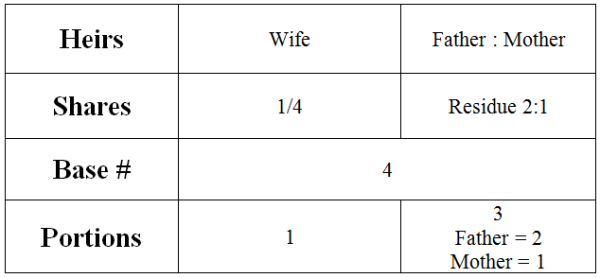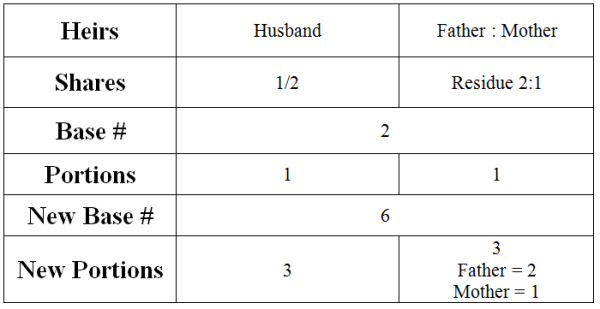Special Case: `Umariyyataini
Below is the answer to the problem we left you with in the previous post:
The estate will be divided into 12 equal portions:
The Husband will get 3 portions.
The Mother will get 2 portions.
The Father will get 2 portions.
The khuntha mushkil will get 5 portions.
In this case, the khuntha mushkil was treated as a male (i.e. son).
Any and all questions regarding the above answer should be posted in the comments section insha’Allah.
There are two specific cases in inheritance in which the normal rules regarding the parents do not apply. These are the following
- Mother, Father, and Husband
- Mother, Father and Wife/Wives.
In these two cases, rather than getting their prescribed shares as zaawil furoodh, the parents will be treated as `asabaat and receive the residue in a 2:1 ratio. The father will get twice the share of the mother, similar to how a son and daughter would inherit. The husband or wife will get his/her prescribed share as normal.
These two cases arose and were resolved during the caliphate of `Umar (radhiallaahu `anhu), and are thus known as the `umariyyataini (The two `Umar cases). These two specific cases are the only ones of their kind, so you, as the reader, must simply memorize these two special cases and be able to recognize them when they appear.
However, there are two conditions that need to be kept in mind about the `umariyyataini cases:
- A scenario can only be established and solved as an `umariyyataini case if those specific relatives are inheriting. If one of the relatives (either a parent or spouse) is taken out or replaced, it will cease to be an `umariyyataini problem and will be solved normally.
- It is necessary that the mothers share be 1/3 for case to be established as an `umariyyataini case. The mother must not be partially excluded to 1/6. If the mother is partially excluded to 1/6, it will cease to be an `umarriyataini problem and will be solved normally. The mother is partially excluded in the presence of descendants (children, grandchildren etc.) or two or more siblings of any kind. Hence, the presence of either of the two will disqualify the case from being an `umariyyataini problem. We will also remind you that although any existing siblings will be excluded by the father, they will still partially exclude the mother to 1/6 if they are two or more in number.
Keeping the above two conditions in mind, we now understand that it will not work (i.e. it will not count as an `umariyyataini problem) if the parents are replaced with grandparents, or if even a single parent is replaced with a grandparent. Such a problem will be solved normally.
Important point to understand: If the mayyit leaves behind only a father and mother (no spouse or any other relative), then we know according to the normal rules of inheritance that the mother receives 1/3, and the father receives 1/6+residue. The end result is that the mother receives 1/3, and father receives 2/3. In other words, the father receives twice the share of the mother. So you see, this is technically not an `umariyyataini case, but its end result is still the same as an `umariyyataini case, which is that the father receives twice the share of the mother. In fact, scholars have used qiyaas (analogical deduction) from this case to determine the special rules for the two `umariyyataini cases mentioned above.
Now, insha’Allah, lets briefly work through two examples of the `umariyyataini cases.
Example 1: A man dies leaving behind
- Paternal Grandfather
- Mother
- Father
- 1 Wife
- 1 Haqeeqi paternal aunt
The haqeeqi paternal aunt is a non-heir. The paternal grandfather is excluded. This leaves us with:
- Mother
- Father
- 1 Wife
Clearly we have our self an `umariyyataini case. As explained, the normal rules go out the window for this problem. Here, the wife will get her 1/4, while the parents share the residue in a 2:1 ratio, with the father getting twice as much as the mother.
Final Answer: The estate will be divided into 4 equal portions:
The Wife gets 1 portion.
The Father gets 2 portions.
The Mother gets 1 portion.
Example 2: A woman dies leaving behind
- Maternal grandfather
- Mother
- Father
- Husband
- 1 Allaati sister
The maternal grandfather is a non-heir. The allaati sister is excluded. This leaves us with:
- Mother
- Father
- Husband
This is the second of the two`umariyyataini cases.
An important nuance to note about this problem is that the existence of another sibling would have canceled out the `umariyyataini problem and turned it into a normal inheritance case. But because there was only one sibling (the allaati sister), it kept the mothers share at 1/3 and thus fulfilled the second condition for an `umariyyataini problem.
Final Answer: The estate will be divided into 6 equal portions:
The Husband gets 3 portions.
The Father gets 2 portions.
The Mother gets 1 portion.
Alhamdulillah, now that we’ve done both `umariyyataini problems, you’ve – insha’Allah – gotten a good understanding of these two special case scenarios.
To conclude this post, lets leave you with a mini-quiz designed to test whether you can recognize an `umariyyataini case when it pops up.
Six inheritance scenarios are provided below. For each case, a list of existing relatives is given. Simply write “Yes” if you think it will end up being an `umariyyataini case and write “No” if you think it will not be an `umariyyataini case. Answer key will be given in the next post, insha’Allah.
Case 1: A man dies leaving behind
- Mother
- Father
- 2 Wives
- 1 Haqeeqi paternal aunt
Case 2: A woman dies leaving behind
- Maternal grandfather
- Mother
- Father
- Husband
- 1 Akhyaafi brother
- 1 Allaati sister
Case 3: A man dies leaving behind
- Paternal grandmother
- Paternal grandfather
- 1 Wife
Case 4: A woman dies leaving behind
- Mother
- Paternal grandfather
- Maternal grandfather
- Husband
Case 5: A man dies leaving behind
- Mother
- Father
- 2 Wives
- 1 Granddaughter
Case 6: A woman dies leaving behind
- Mother
- Father
- Husband
- 1 Haqeeqi brother
- 2 Haqeeqi nephews (sons of haqeeqi brother)


